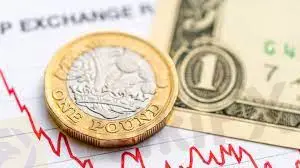简体中文
繁體中文
English
Pусский
日本語
ภาษาไทย
Tiếng Việt
Bahasa Indonesia
Español
हिन्दी
Filippiiniläinen
Français
Deutsch
Português
Türkçe
한국어
العربية
When are the UK data releases and how could they affect GBP/USD?
Abstract:The British economic calendar is all set to entertain the cable traders during the early hours of Friday, at 07:00 GMT with January 2022 GDP figures. Also increasing the importance of that time are Trade Balance and Industrial Production details for the stated period.

The UK Economic Data Overview
Having witnessed a contraction of 0.2% in the economic activities during December 2021, market players will be interested in Januarys monthly GDP figures to confirm the recently hawkish bias of the Bank of England (BOE).
Forecasts suggest that the UK GDP will reverse the previous drop with 0.2% MoM in January. GBP/USD traders also await the Index of Services (3M/3M) for the same period, likely to remain unchanged with 1.2% growth, for further insight.
Meanwhile, Manufacturing Production, which makes up around 80% of total industrial production, is expected to remains unchanged with 0.2% MoM in January. However, the total Industrial Production is expected to ease to 0.1% versus 0.3% previous growth.
Considering the yearly figures, the Industrial Production for January is expected to have rallied to 1.9% versus 0.4% previous while the Manufacturing Production is also anticipated to have rose to 3.1% in the reported month versus 1.3% the last.
Separately, the UK Goods Trade Balance will be reported at the same time and is expected to show a deficit of £12.6 billion versus a £12.534 billion deficit reported in December 2021.
How could affect GBP/USD?
GBP/USD licks its wounds around a 16-month low ahead of the key UK data releases. The cable pairs latest rebound to 1.3090 could be linked to the USD pullback amid mixed concerns in the market.
As the BOE has already played its cards and the Fed now has an upper hand over every other major central bank, as far as the market‘s preparations for a hawkish move is concerned, the GBP/USD pair has a further downside to track. However, extremely positive data may help redirect the market’s attention to the “Old Lady” and can help the cable to extend the latest rebound from a multi-day low.
Ahead of the event, Westpac said, “Volatility in the trade balance will likely be present in January as the UK continues to navigate COVID-19 and Brexit uncertainties (market forecast: -£2.4 billion). January GDP is seen up just 0.1% month.”
Technically, GBP/USD bears remain hopeful until the quote stays decisively above December 2021 low surrounding 1.3160.
Key notes
GBP/USD Price Analysis: Bears are firmer below 61.8% Fibo retracement, 1.3000 eyed
GBP/USD hits fresh 52-week low at 1.3080 on renewed fears over Ukraine crisis
About the UK Economic Data
The Gross Domestic Product released by the Office for National Statistics (ONS) is a measure of the total value of all goods and services produced by the UK. The GDP is considered as a broad measure of the UK economic activity. Generally speaking, a rising trend has a positive effect on the GBP, while a falling trend is seen as negative (or bearish).
The Manufacturing Production released by the Office for National Statistics (ONS) measures the manufacturing output. Manufacturing Production is significant as a short-term indicator of the strength of UK manufacturing activity that dominates a large part of total GDP. A high reading is seen as positive (or bullish) for the GBP, while a low reading is seen as negative (or bearish).
The trade balance released by the Office for National Statistics (ONS) is a balance between exports and imports of goods. A positive value shows trade surplus, while a negative value shows trade deficit. It is an event that generates some volatility for the GBP.

Disclaimer:
The views in this article only represent the author's personal views, and do not constitute investment advice on this platform. This platform does not guarantee the accuracy, completeness and timeliness of the information in the article, and will not be liable for any loss caused by the use of or reliance on the information in the article.
Read more

Will the Euro and US Dollar Reach Parity in 2025?
Euro-dollar parity sparks debate again as 2025 approaches, with multiple factors shaping the exchange rate outlook.

US Dollar Surge Dominates Forex Market
The global forex market continues to show volatility, with the U.S. dollar fluctuating last week but overall maintaining a strong upward trend. How long can this momentum last?

Oil Prices Soar for 5 Days: How Long Will It Last?
Last week, the global oil market saw a strong performance, with Brent crude and WTI crude prices rising by 2.4% and around 5% respectively. Oil prices have now posted five consecutive days of gains. But how long can this rally last?

How Big is the Impact of the USD-JPY Rate Gap on the Yen?
The U.S. Federal Reserve's repeated rate cuts and the narrowing of the U.S.-Japan interest rate differential are now in sight. So, why is the U.S.-Japan interest rate differential so important for the yen’s safe-haven appeal, especially when global economic uncertainty rises?
WikiFX Broker
Latest News
High-Potential Investments: Top 10 Stocks to Watch in 2025
US Dollar Insights: Key FX Trends You Need to Know
Why Is Nvidia Making Headlines Everywhere Today?
Discover How Your Trading Personality Shapes Success
FINRA Charges UBS $1.1 Million for a Decade of False Trade Confirmations
Bitcoin in 2025: The Opportunities and Challenges Ahead
BI Apprehends Japanese Scam Leader in Manila
Big News! UK 30-Year Bond Yields Soar to 25-Year High!
SQUARED FINANCIAL: Your Friend or Foe?
Join the Event & Level Up Your Forex Journey
Currency Calculator






